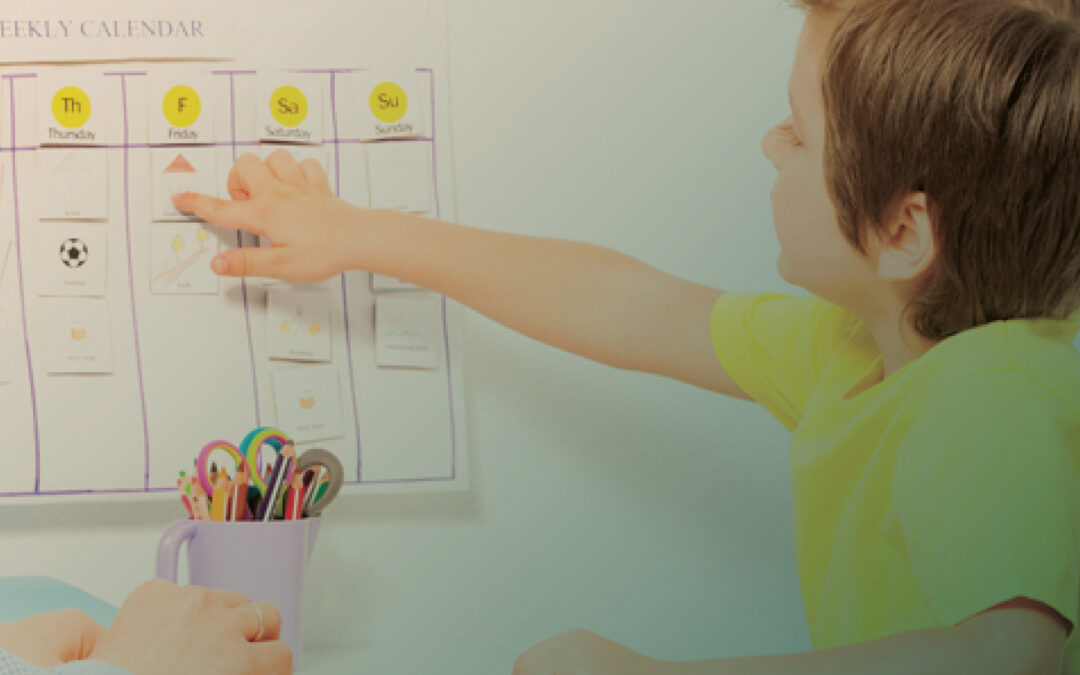
by Jessie Cooper | Dec 11, 2025
This week I’ve been asked to write to you about what we value at Instructional ABA Consultants. If you are an employee or family we serve, I’m sure that you’ve received a welcome letter from us listing our values. Broadly speaking we value clear communication, compassion, integrity, and accountability. These values were created, then re-created by my incredible team that has stood by my side since the beginning of IABA. In typing this I’m smiling fondly thinking about our old round tables in the first office. This is where we decided who we wanted to be as a company. Today, the same faces that sat beside me are the directors and supervisors you all know so well, directors who all started with me, boots on the ground, to build a company we’re proud of.
In reading over the list of our values, I know that they ring true to what we expect from ourselves and others at IABA. It’s hard to believe that almost fourteen years ago the dream I had to build a company for clients who couldn’t find anyone to take their funding has blossomed into the company I oversee today. As a passionate (ok, fiery) young professional I was deeply in love with applied behavior analysis and how it could change lives when done with integrity. I was also beyond angry that mainstream ABA companies were accepting clients based on their insurance fee schedule not their clinical needs. Through my love and anger I decided that if no one was going to serve the underserved in my community, I’d figure out how to run a company. I mean, my dad owned a farm market. How hard could it be?
Years later I’m smiling to myself about both my ambition and my naive beliefs about what it takes to run a successful business. Thank goodness for youth that gives us wings to try something not knowing how often we will crash before we truly know how to soar.
The Art of Discipline
Over the years of running IABA it has felt as though I’ve lived a thousand lives. It turns out what it takes to run a successful business is a lot and just when you think you’ve learned what it takes another challenge comes knocking. This is especially true for us at IABA because our primary funding is waiver and Medicaid dollars. To access this funding and serve our clients with it is, well, challenging to say the least. And to uphold the magic of ABA done correctly? That, my darlings, is a fine-tuned machine that takes daily attention and care. You see, all those years ago when we decided our values, we also built a scientific performance system. Gently humming behind every skill learned, behavior decreased, and company policy is a data point.
As I write these words to you about what we value at IABA, I know that the business answer here is what we put on all of our paperwork. I’ve told the story I’ve written above more times than I can count. It’s my classic elevator speech, “I was a young BCBA who was…” I’m sure if you read back through my previous blogs you’ll find the trend of our origins – young scientists who were angry at corporate America turned into middle aged scientists still angry at corporate America. Yet when I sit with myself in silence and really think about what we value at IABA, all of the words I’m writing to you fall away and one word softly sits within my heart – humanity.
A Love of Humanity
When you are creating a business on a napkin that becomes a fully operational business, there has to be a why. As an entrepreneur I understand that we need all of the policy, procedures, and business savvy language to ensure we are organized as a business. Giving our staff key touch points like our values helps us all stay centered in knowing both what we expect from each other and what we are committed to providing our clients. But truly, when I look at the team I have today, I know we could wipe away all the noise and in the heart of every employee at IABA one value beats true.
We believe that every child who walks through the door deserves to live their very best life. We’ve held the hands of countless parents who don’t understand their autistic child and need support. And we’ve listened to their hearts asking, “Will my child be okay? Will you treat us right? Do we have to fight for what they need?” Time and time again my staff reply, “We’ve got you.” Because we do. We see that parents are having a difficult enough time as it is and need a company that sees their child as just that, a child. And a company that will offer the highest quality of care using not just the science but the art of ABA.
At IABA we also know that the children we serve grow up to be adults and while we prepare them in our children’s division for this, we also serve adults. While our goal is that every child graduates ABA, we also know that adults living in group homes didn’t have access to ABA as children. Without childhood services, adulthood can be difficult for adults with disabilities. And there are certain disabilities that need lifelong care. My staff see that, too, and so we serve across the lifespan with our science helping wherever we can.
Years ago, I sat with my grandpa talking about faith. He asked me, “Jessie, who will you serve?” I had no idea at the time I would build IABA. Sitting here today, thinking about who we are as a company, I know I have found who I’ve wanted to serve in this chapter of my life. Yes, we have core values. But, my darlings, what we truly value is each other. The lives that walk in our door matter to all of us. When I rest my weary head on the shoulders of the team I have grown up with, I know we’re all doing what we’ve always wanted to do – give each other and our clients a chance to shine. Humanity, at IABA we value humanity.
Xoxo,
Jessie Cooper

by Jessie Cooper | Nov 13, 2025
The last time I wrote to you, darlings, we talked about the value of visual aids. In that blog I shared about how neurodiverse children and adults can use visual aids to communicate. This past month was AAC (Augmentative and Alternative Communication) month, a month where we celebrate those among us who speak using different modes of communication. I hope, darlings, that if you have a child with a disability, this past month brought joy in learning new ways to hear their voice.
Building on the use of visuals, this week I want to talk to you about a simple intervention that can change frustrating moments to moments of peace. Well, full disclosure, future moments of peace because learning a new skill takes time. This intervention is, “I need a break.” It sounds simple and as though an entire blog isn’t necessary. If you’re a tired parent like me, I’m sure that you’ve either muttered these words to yourself or exclaimed to your child that they in fact need to excuse themselves. See? You’re already taking breaks. And if you’re anything like me, I’m guessing these breaks come after moments when life gets to be too much. While noticing you need to recharge is good stuff, the intervention I’d like to talk to you about is one that is used before life is too much.
This topic and concept can be used across parents, relationships, neurodiverse children, typically (gosh I wish there was another word…) developing children. The concept of asking for and using a break is a tool to pause an uncomfortable moment and regulate before deciding the next right step. It is in short the gift of not pushing ourselves, our partners, or our children through a moment when the downstairs brain (limbic system/body functions) is activated. When any of us is activated (heightened negative emotions), our body turns on to get away from those emotions. I’m sure you’ve all heard the term “fight or flight,” and each of us has a response just like this when we’re upset; your kiddos do, too. So when big feelings and big emotions come together, it is an impossible storm of natural responses and, darlings, a break is needed.
Taking Pause
In writing this to you, I’m also writing it to myself. I have some big feeling little guys who spend a lot of time in their downstairs brain when they get upset. I’ve spent more time than I’d like to admit exhausting us all with knowing what I know. My tired brain says, “You should know how to behave nicely, you should stop fighting with your brother, you should see mama is exhausted, you should…fill in the blank.” These scenarios always end with a more exhausted me and children who haven’t learned anything except their big emotions are a problem. And ugh, that is the last thing I want to teach my children. I want to teach them how to navigate their big emotions, learn the messages, self-soothe, and walk themselves back to their upstairs brain (the thinking brain).
Recently after an extremely full weekend and too many shoulds, my thinking brain turned back on and reminded me – we need to take breaks. A break in our home is going to look different depending on what behaviors are happening. My children are young and a break (as nice as it would be) is not going to look like “Oh honey bunny, you’re hitting your brother and calling names” followed by “You’re right, mama! I’m going to take a break.” It’s going to look like me calling the break calmly, “I see you’re really upset, it’s time for a break,” and enforcing it with some often pretty upset little guys. And it will also look like earning points towards a reward if they call the break themselves and use their tools to calm down.
Practice Makes Perfect
I spend a lot of time with the boys practicing activities that feel good (yoga, sound drums, baths with icy treats, music, bike riding, feet up the wall, weighted blankets, and the list goes on and on). My guys know what feels good to their bodies, and it’s a learning curve to ask for a break when their downstairs brain is on. And it’s a learning curve for me to admit my downstairs brain is on and I need to use my tools (and breaks) too.
In traditional therapy, this is called “calling the code,” which in short means as a family you create a word that is understood as a need for a break because emotions are high. I’ve heard many marriage and family therapists teach this tool to couples during arguments – “porcupine, honey,” and you get to walk away and cool down. In our practice as behavior analysts we teach this as a break card. For neurodiverse children oftentimes they don’t know how to tell us “I don’t want to, that’s too hard, NO thanks…” and so we teach them how to ask us using a visual. A break card isn’t always a get out of the task free card, but it is always a get out of the task when asking nicely and come back later. It is also teaching cool down tasks to regulate during the break just like my own children.
This works very similarly to when, for example, your child is throwing a fit over cleaning their room. The lesson you want to teach first is how to soothe their emotions and that darn downstairs brain. Then, when they’re calm, you can use reason and logic to teach the importance of taking care of their things and enforce cleaning their room.
The gem I’d like to leave you with is, “You can’t teach if the learner isn’t thinking.” When our children are upset or we are upset, it is not the time to parent or solve a problem. It’s time to take a break and come back once we’ve soothed our body and hearts. Lay those shoulds down darling, you’re doing beautifully. Take a moment, take a break, and reconnect to that wonderful heart of yours. And to your raging little one, offer peace in breaks.
Xoxo,
Jessie Cooper

by Jessie Cooper | Oct 23, 2025
In my last several blogs I’ve written to you about the transition into the school year and the helpfulness of visuals. It is my hope that in writing to you I’ve been able to guide your family into the school year with new insights. As a mama, I know how anxiety ridden the start of the new school year can be. Above all else I want you to know that your child deserves to thrive.
With that in mind I’ve been asked to write a letter to parents who are starting their journey with ABA therapy. With over 18 years in the industry and almost a decade as a mama I’m hoping to write this letter in a way that supports you. Starting anything new for your child can be scary. For me, when I feel lost and alone, education brings me peace. I may not be able to address everything you need to know, but, darlings, I hope to give you a guide to follow at the start of your journey should you choose ABA for your child.
Dear Parents,
If you’re reading this letter, you are in fact at the crossroads of starting a new therapy for your child. In considering beginning therapy, you have already taken a thousand steps to get here and landed in a place to be proud of – the place of realizing that your child needs help and in turn that you as a family need help. As a parent I’ve walked this path with you with therapies for my own children. I do not want to discount the weight of this journey because it is an incredibly difficult one. I believe every parent wants their child to thrive, and when your child begins to struggle in our social world, that struggle is carried by you first and foremost. You want your child to succeed, you want your family life to be peaceful, you might even crave normal while asking yourself, “What is normal?” All the while feeling guilty for even thinking about it. You have mentally carried this to the point of believing that you can’t do this alone. That right there is bravery.
In looking up the type of help you need, if your child is autistic, you will quickly find Applied Behavior Analysis is the only evidence-based therapy for your child. Then (if you’re anything like me) you’ll scroll into the depths of the web and find triumphant stories, hope, and an entire movement against ABA. Given this information I’m guessing you will grapple with wanting evidence-based care and not wanting the horror stories of ABA done wrong. You might talk to your pediatrician, you’ll definitely talk to other parents, and in the end if you choose ABA you will tentatively begin calling providers. All of this belongs. You are a parent and making a choice to start ABA brings trepidation. And, the choice to start ABA brings hope.
Okay, my darlings, we’re where I’ve needed us to start and end. We started with your bravery, walked through fears, and ended with your bravery to choose help for your child. You are incredible. You are doing the hard thing. Before setting expectations for ABA, my loves, pat yourself on the back, rub your heart, and acknowledge everything it took to bring you here. As we look to the beginning of your search for an ABA provider, there are some key points I really want you to know. For the sake of ease, I’m going to list them:
- Providers should never begin ABA without a diagnosis of autism and an authorization from your insurance carrier (without these you are at financial risk).
- Quality assessments to create individualized interventions take time! And insurance processing takes time. Expect 6-8 weeks after your intake meetings to start services; anything quicker is cutting corners for financial gain.
- No, not every child under 5 years of age needs 40 hours a week of ABA. Providers who require this want profit above outcome.
- Yes, your BCBA should be in charge of recommending the hours of treatment and you as a family should agree with these hours before treatment begins.
- All client programs NEED ascent withdraw as the first program taught. This program in short teaches your child to say, “No,” which is the most valuable skill we can teach children with special needs.
- Forced-compliance is never, not ever okay. If your ABA provider is making your child complete tasks while they are distressed, this is not ABA. All children deserve time to calm down, even if they do need to complete the task in the end.
- As parents you should be shown your child’s assessment and goals. You should also receive monthly training on the goals and know what your child is learning.
- Behavior reduction done well takes time. We don’t have a magic wand but we do have a pretty cool science that in the end will help your child decrease the behaviors they struggle with and increase adaptive language.
- Clinic-based treatment only will limit their success; as a child learns goals and gets older, home-based and community sessions are needed.
- The goal of all providers should always be to graduate your child from ABA. Graduation does not mean their autism is gone, it means that ABA has helped them to live in a meaningful and independent way.
It is my hope that with this letter I am giving you a tool to take with you as you interview ABA providers. That is in fact what we should all be able to do as parents – ask questions, get answers, and feel confident in the services we are selecting for our children. If IABA ever becomes the place you choose to receive ABA services, we will uphold the standards of care I’ve listed. And, should you go somewhere else (as many of you will), stay informed and active. Know it’s your right to ask questions and see results.
Xoxo,
Jessie Cooper

by Jessie Cooper | Oct 9, 2025
In my last blog to you we talked about navigating going back to school. How’s it going, darling? Is your child thriving with an incredible teacher? Or, after a month of school are you (and your kiddo) ready to call it quits? Wherever you are in your education journey this fall, my hope is you believe you and your child deserve the absolute best. And, if your child’s school environment is not working, you are finding your way to advocate for their needs. No matter what you are experiencing I believe that you and your child deserve peace and support. I’ve got you, and you’ve got you.
Outside of the school system there are dozens of suggestions for making our children’s lives better. When your child is neurodiverse or learns differently, at times it can be overwhelming to know what strategy or intervention works best. That is one of the many reasons I’m in love with ABA; it’s idiosyncratic. Or in other words each intervention is built specifically for your child (or should be Big Box ABA…). That being said, there are tools that can be helpful for a lot of children. One of my very favorites to recommend is the use of visuals.
Thinking Visually
Years ago when I was learning about ABA I came across Temple Grandin and her book “Thinking in Pictures”. In this memoir Temple writes about how her mind thinks with pictures and not words. While not all autistic people think visually before they think with language, it gave me insight into testing language when I was learning to practice ABA. As a young BCBA I spent time testing what we call receptive language (what we hear) and expressive language (what we say). In my work I used many different tools to test language, pictures being one of them.
In my time as a practicing BCBA I found that each learner of course tested differently. However, the most impactful to me was working with autistic adults who did not have access to ABA as children. These adults were brilliant and wonderful. And, because no one had taught them how to use language, the individuals I was working with were very limited in their language. That’s not to say all neurodiverse adults present this way without ABA. It was the population I was working with who did not learn language naturally and were stuck in their language abilities.
Before my time with these adults I had thought I wanted to work in early intervention. When I met these beautiful people, I knew I wanted to help anyone I could who needed access to ABA. There are several clients who stay with me; Aubrey was one of those who changed my life.
An Incredible Story
Aubrey was a young autistic man who worked at a warehouse in the packing department. Aubrey was kind, gentle, and hardworking. Until Aubrey was not and became extremely physically violent at work. I was called in for the crisis and began my work with Aubrey. The first test I completed was of course language; problem behaviors are communication so I wanted to see what Aubrey was trying to say. In my testing I pulled out a series of pictures. Aubrey pulled the binder to him with tears running down his face and snatched a shoe picture. He pointed to his own feet, then shoved the picture to me. I bent down to remove his shoes and saw blisters everywhere. Aubrey’s group home put him in the wrong shoe size, he didn’t have a way to tell them, and his feet hurt. After a day of shoe shopping and a binder full of pictures for his needs, Aubrey’s life changed. The aggression was gone (along with the pain) and Aubrey was back to himself.
Finding Voice
While this story is unique, the principle is not. Individuals with autism can think in pictures before language and so having visual aides and pictures gives them access to our social world. Often autistic children who think in pictures do not know what we call the things they see. ABA therapy (and parents) can build their understanding of our social world by teaching them, one picture at a time, the labels of the pictures they see. Once a child knows what an item is called, they learn how to ask for it. It’s a beautiful thing to watch and build – turning pictures into words. And words into meaning.
Outside of using visuals for language, parents can also use visuals to simply explain the day. Calendars and visual schedules can remind children what is coming next and help to reduce anxiety. I’ve been divorced for 5 years and for 5 years I have made a monthly calendar for my boys to know where they will be. Today is the first day of October and as I packed little Spidermans on the bus (no, it’s not costume day…) my youngest reminded me to make our calendar. It’s peaceful for them to see their world visually. It can bring peace for all children (and ourselves) to know what is coming next.
So, my darlings, as you digest my words to you, I hope to leave you with this. Not all tools are created equally and language in a social world is a powerful tool. Being able to understand our social world, how to ask for our needs, and knowing what is coming next is calming for all of us. If you are the parent of a neurodiverse child, pictures just might be the tool they need to express themselves. And, if they can verbally express themselves, pictures could also be the tool you use to explain the routines of their lives. However you choose to experiment with pictures, my hope is it adds value to your child’s life. And I’m hoping you’re still smiling a little for Aubrey.
Xoxo,
Jessie Cooper

by Jessie Cooper | Sep 18, 2025
In my last blog I wrote to you about meeting your child where they are on their journey back to school. How is it going, darlings? Has your family adjusted to the new routine of school? How is your child doing with their teachers? Their friends? That new sleep schedule? Activities, anyone? I know you can’t answer my questions with simplicity because back to school season is anything but simple. It’s a season of adjustments. My hope is that for all it is going well, but as a mama I know far too well nothing can go well all of the time. This time around I’m hoping to provide some guidance if your child’s needs aren’t fully being met at school.
Peering into Education
To start our journey together I’d like to take you back about 20 years (I know, I’m dating myself here!). Nearly two decades ago I was completing my undergraduate degree in early childhood education and working as an aide in a preschool. At the time colleges were adapting to “No Child Left Behind” and teaching us how to implement standardized curriculum. Simultaneously in my job placement I had special needs students (undiagnosed autism) who were not being identified and teachers at their wits end on how to teach them. The teachers I worked with were two of the most caring people I had ever met. Their frustration came from not knowing how to help their students while also preparing children for a standardized learning world. This is the start of my journey into ABA and why I started as a home-based therapist to help special needs children. I too wanted to know how to help.
Fast forward about a decade and I had become a BCBA and business owner and was on my way to parenthood. During this decade I spent countless hours with parents, teachers, autistic children, and schools. You see, when I find an under-resourced population both my brain and my heart light up. I love using our science and math to create sustainable resources. In the first decade when I was becoming a BCBA and business owner, one thing ran true in every situation – people were trying their best. As I sat beside struggling children, parents, and teachers, it was not a lack of caring, just like my mentors, but a lack of resources (and often education) that created their frustration. You see, standardized teaching works wonderfully for the median student, but any child on the edges can get lost. Teachers are not readily given the resources or training to help those students.
If we look at this refrain that teachers have signed up to work with children because they truly love them but have been taught to teach to the norm, I am hopeful we can access some compassion. When you have a child who can’t assimilate, they are perfectly performing (remember the learner is always right) with the skills they have. And teachers are trying to provide for their needs without the support they may truly need to help your child. If it rings true for you that you have a child who learns differently or is struggling in school, I hope this refrain helps you to soften towards your school. Once you soften then also lean into the fact your child deserves to thrive and you are their best advocate for getting their needs met at school. Every child deserves a fair, free, and equal education. As their parent you are the biggest voice in the room for your child.
As Your Child’s Advocate
When a child is struggling at school, they need and deserve accommodations. While some schools are well resourced in providing these accommodations, others aren’t (or are part of a good district but with not quite there teachers). As your child’s advocate you get to voice concerns over how your child is progressing in school and what needs they have based on their different ability. You know your child best and as their parent you also know how you hope school can help them grow. Many of our families at IABA achieve this by using a collaborative approach between their home-based ABA team and school team. The art of ABA is to teach idiosyncratically to neurodiverse children alongside social goals set by the parent. If a child at IABA is struggling at school, often crossing over ABA to the school team provides both the advocacy and education to support the child. This can also be true outside of ABA. As a mama, if my children are struggling at school, my first step is to have their outside counselors connect with the school. Teamwork does in fact make the dream work.
At IABA we have carried on our mission for over 13 years to provide services across funding sources, and we navigate red tape to do so. This means that depending on funding and location, how we provide support in school can look different. For instance in Colorado we can provide RBT support in the school and in Illinois we currently support with IEPs, consultations, and at times vendor contracts. We hope to provide RBT support in school someday and are continuing to work with our funders. And, if you’re not a client of IABA, while these examples may not apply, my hope is that the message does. Collaboration with your child’s village of professionals helps them to thrive.
So, my darlings, as you settle into the school year with your child who is perhaps not settling, remember first and foremost they deserve to thrive. Keep your hopes and goals high for your child while walking alongside the teachers who are doing their best with the resources they have. If the school is not able to meet your child’s needs, collaborate and advocate. People don’t know what they don’t know. The beauty of ABA that keeps my fire going all these years is that it provides the resources necessary so that every child can learn. Their home-based success in ABA and other outside therapies just might be the resources their school needs to know about so they can thrive.
Xoxo,
Jessie Cooper






